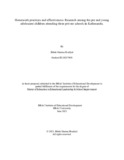| dc.contributor.advisor | Rashid, Mamunur | |
| dc.contributor.author | Poudyal, Bibek Sharma | |
| dc.date.accessioned | 2024-01-17T04:22:23Z | |
| dc.date.available | 2024-01-17T04:22:23Z | |
| dc.date.copyright | 2023 | |
| dc.date.issued | 2023-06 | |
| dc.identifier.other | ID 20257019 | |
| dc.identifier.uri | http://hdl.handle.net/10361/22172 | |
| dc.description | This thesis is submitted in partial fulfillment of the requirements for the degree of Masters of Science in Early Child Development, 2023. | en_US |
| dc.description | Cataloged from PDF version of thesis. | |
| dc.description | Includes bibliographical references (pages 56-59). | |
| dc.description.abstract | The paper explores various aspects related to homework practices and their impact on students'
academic achievements and mental health. The study reveals that private schools generally have
well-equipped infrastructure that creates an ideal learning environment for students. The findings
suggest that students' academic performance is closely linked to the assignments they receive, with
higher-ranking students displaying a more positive attitude towards homework compared to lowerranking
students. However, it is unclear whether assignments directly influence students' rankings
or if their academic motivation shapes their perception of homework.
The study notes that students often spend more time on homework than recommended, which can
negatively impact their mental health and reflect the difficulty or volume of the assignments.
Parental involvement is found to be significant, with positive engagement positively affecting
students' attitudes and academic performance. In short, the study highlights the importance of
considering individual student requirements, learning styles, and goals when determining the
appropriate quantity and frequency of homework.
The prevailing homework practices in the studied schools largely rely on traditional approaches,
such as assigning textbook exercises. However, there is a need for adjustments and improvements
in homework practices, including incorporating technology, designing differentiated and engaging
assignments, and providing feedback to students. Recommendations include reevaluating
homework load and curriculum, encouraging parental involvement, utilizing technology
effectively, and implementing creative and differentiated approaches to assignment design.
The paper concludes by emphasizing the importance of balanced and thoughtful homework
practices that consider individual student needs, foster engagement and motivation, and support
academic achievement and mental well-being. Further research and collaboration among
educators, parents, and policymakers are recommended to refine and improve homework practices
for the benefit of all students. | en_US |
| dc.description.statementofresponsibility | Bibek Sharma Poudyal | |
| dc.format.extent | 80 pages | |
| dc.language.iso | en | en_US |
| dc.publisher | Brac University | en_US |
| dc.rights | BRAC University thesis reports are protected by copyright. They may be viewed from this source for any purpose, but reproduction or distribution in any format is prohibited without written permission. | |
| dc.subject | Adolescent children | en_US |
| dc.subject | Private schools | en_US |
| dc.subject | Kathmandu | en_US |
| dc.subject | Homework practices | en_US |
| dc.subject.lcsh | Child development | |
| dc.subject.lcsh | Adolescence | |
| dc.title | Homework practices and effectiveness: research among the pre and young adolescent children attending three private schools in Kathmandu | en_US |
| dc.type | Thesis | en_US |
| dc.contributor.department | Institute of Education Development, BRAC University | |
| dc.description.degree | M. Early Child Development | |

